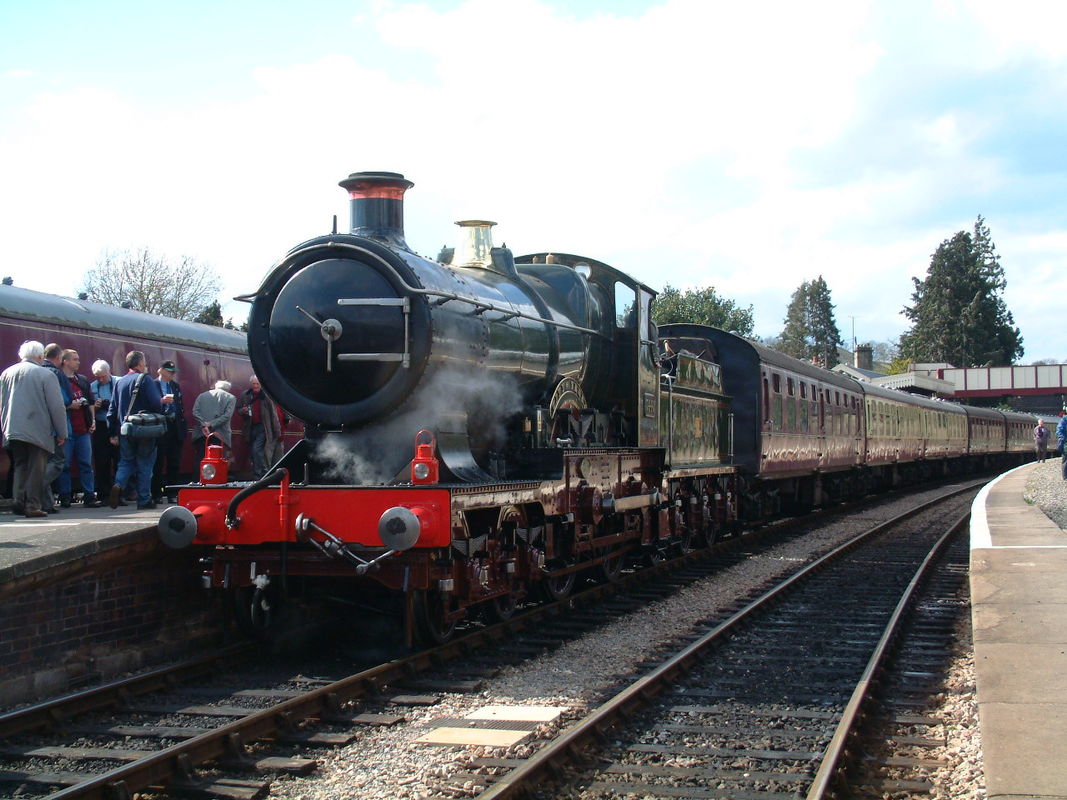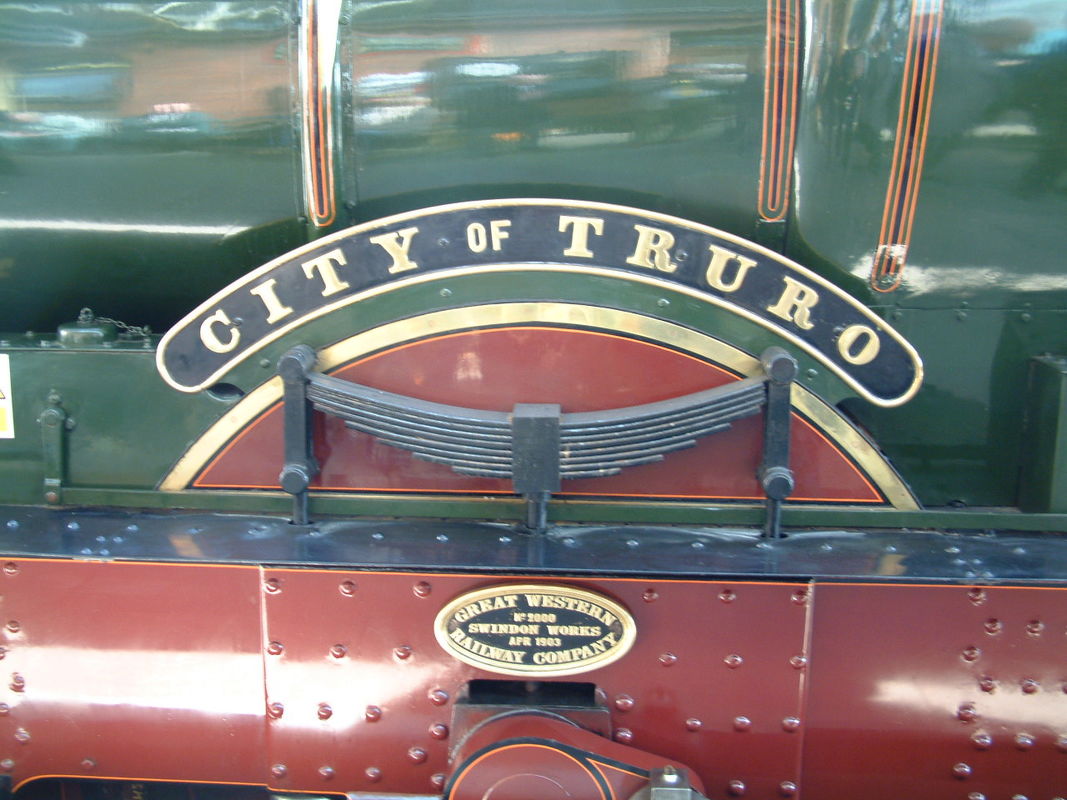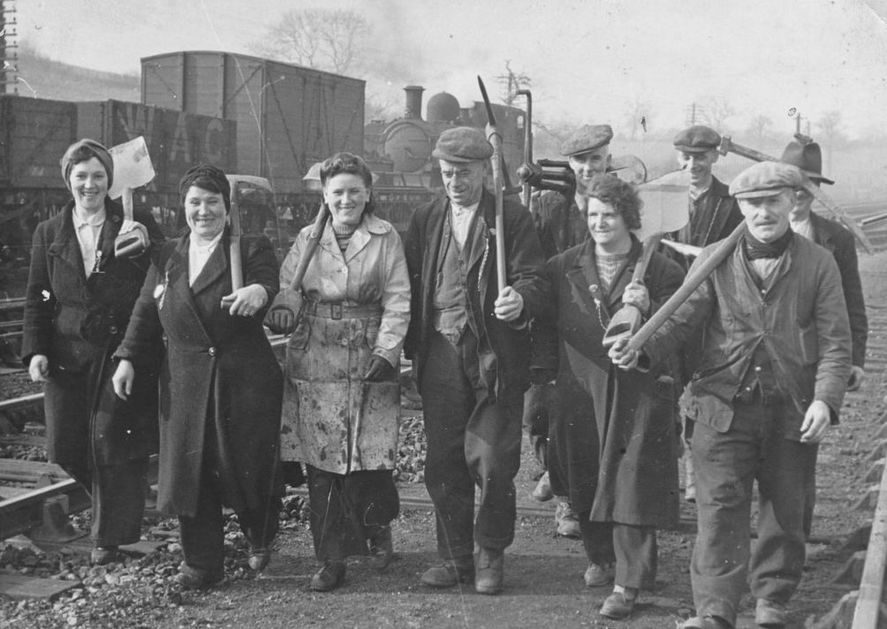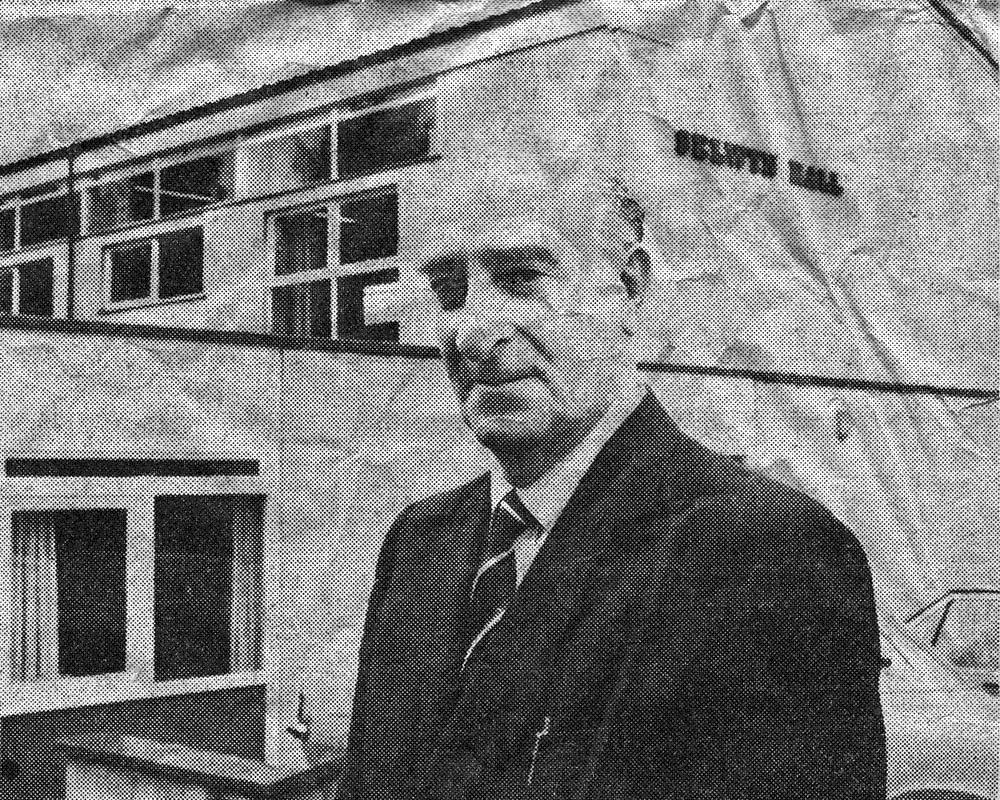Box Railway Men Remembered
|
Moses Clements' Story Michael Rumsey August 2017 I have been looking at the employees section on the Great Western Railway in Box in the last edition. You have mentioned Moses Clements, an engine cleaner who rose through the ranks to become a driver. Right and Below: The engine that Moses drove on 9 May 1904. Michael took these photos while travelling behind 3440 on the Gloucestershire Warwickshire Railway several years ago. |
Moses Clements is quite famous in GWR history as the driver of 3440 City of Truro which in May 1904 attained a speed of 103.4 mph while descending Wellington bank with a special mail train from Plymouth to London via Bristol and Box. They changed engines at Bristol with a Dean single, 3065 Duke of Connaught taking over for the rest of the trip through Box and arriving in Paddington in record time. The City of Truro is part of the collection of the National Railway museum in York.
|
The 3440 City of Truro was built at Swindon in 1903, engine number 2000 from the works. Moses Clements was based at Exeter engine shed at the time and was chosen to drive the engine on this day when it was hauling five mail coaches containing transatlantic mails having been landed from the Kronprinz Wilhelm. The speed it attained descending Wellington bank from Whiteball tunnel was 102.3 mph, though at times this has been disputed.
Moses Clements was highly thought of in GWR circles and his name will always be associated with the City of Truro’s famous run on that day. |
Bill Robbins and Jim Farmfield Roy Bradley September 2017
I recall two railway men who lived at Middlehill in the years just after the Second World War. Jim Farmfield lived in one of the cottages just beyond Toad Hall, Middlehill. He was probably a security man because I always used to meet him late at night walking up The Avenue when he was returning home. He would carry a railway lantern to light the way and on misty nights it was really alarming to see a shadowy figure and hand-held lantern coming towards me along the road.
Bill Robbins was a porter at Box Railway Station who also lived in Middlehill, in the cottages towards Coles Farm.
I recall two railway men who lived at Middlehill in the years just after the Second World War. Jim Farmfield lived in one of the cottages just beyond Toad Hall, Middlehill. He was probably a security man because I always used to meet him late at night walking up The Avenue when he was returning home. He would carry a railway lantern to light the way and on misty nights it was really alarming to see a shadowy figure and hand-held lantern coming towards me along the road.
Bill Robbins was a porter at Box Railway Station who also lived in Middlehill, in the cottages towards Coles Farm.
Montague Prosser Chaffey Colin Lindzey, August 2017
Montague Prosser Chaffey (seen above front right) was born in Bull's Lane, Box, in 1885 and trained as a stone mason. His family were well-known masons closely connected with the Bath and Partland Stone Firms. But after the First World War, the industry was in steep decline and Prosser (as he was known) took a different career direction, joining the Great Western Railway was a linesman in Bristol.
It was his responsibility to erect and maintain electrical power and telephone wire alongside the railway tracks in an initiative to modernise the system and ensure trains ran on time and with a minimum of disruption between tietabled passenger services and freight services. The photo above is undated but appears to be from the Second World War period when women were part of the work force maintaining the railway system.
In his later years in Bristol he was a lengthman, responsible for all aspects of sections of the line. Prosser died in 1971.
It was his responsibility to erect and maintain electrical power and telephone wire alongside the railway tracks in an initiative to modernise the system and ensure trains ran on time and with a minimum of disruption between tietabled passenger services and freight services. The photo above is undated but appears to be from the Second World War period when women were part of the work force maintaining the railway system.
In his later years in Bristol he was a lengthman, responsible for all aspects of sections of the line. Prosser died in 1971.
Shunter Walter Long Alan Payne October 2017
Walter Long lived at Station Cottage close to the Northey Arms for over thirty years. At first he worked as a porter for the GWR, later promoted to a shunter moving the freight wagons and the banker engine out of the way of the main line. The cottage was small reported in the 1911 census as 2 bedrooms and kitchen.
Our attention has been drawn to an article in the The Wiltshire Times of 14 February 1903 which recalls the 33 years of service given by Walter Long to GWR:
In the waiting room at the Railway Station on Wednesday evening, a presentation was made to shunter Long, who has been stationed at Box for several years and has now retired from the companys service. The presentation took the form of two arm chairs, an Axminster rug, ladies work box and Bible subscribed for by members of the staff and other friends as a mark of esteem. Mr HRN Pictor, in asking Mr Long's acceptance of the articles named, bore testimony to the recipient's integrity of character. For a period of 33 years he had known Mr Long who had given every satisfaction to the various stone firms and traders by the diligent and painstaking manner in which he had performed his duties. This testimony was borne out by Signalman Bow and others and Mr Long expressed his thanks for the gifts.
Walter Long lived at Station Cottage close to the Northey Arms for over thirty years. At first he worked as a porter for the GWR, later promoted to a shunter moving the freight wagons and the banker engine out of the way of the main line. The cottage was small reported in the 1911 census as 2 bedrooms and kitchen.
Our attention has been drawn to an article in the The Wiltshire Times of 14 February 1903 which recalls the 33 years of service given by Walter Long to GWR:
In the waiting room at the Railway Station on Wednesday evening, a presentation was made to shunter Long, who has been stationed at Box for several years and has now retired from the companys service. The presentation took the form of two arm chairs, an Axminster rug, ladies work box and Bible subscribed for by members of the staff and other friends as a mark of esteem. Mr HRN Pictor, in asking Mr Long's acceptance of the articles named, bore testimony to the recipient's integrity of character. For a period of 33 years he had known Mr Long who had given every satisfaction to the various stone firms and traders by the diligent and painstaking manner in which he had performed his duties. This testimony was borne out by Signalman Bow and others and Mr Long expressed his thanks for the gifts.
Wilf Clothier Margaret Lambert September 2017
Wilf was from Castle Carey and came to Box in 1926 as a railway clerk.[1] He worked for GWR for the next 47 years rising to the rank of stationmaster at Box, then Melksham and later at Holt. In later life he was transferred to the divisional managers offices in Bristol. He received various accolades from the railways including a gold watch and retired in 1971 when he ploughed his energies into upgrading facilities in Box.
Wilf was from Castle Carey and came to Box in 1926 as a railway clerk.[1] He worked for GWR for the next 47 years rising to the rank of stationmaster at Box, then Melksham and later at Holt. In later life he was transferred to the divisional managers offices in Bristol. He received various accolades from the railways including a gold watch and retired in 1971 when he ploughed his energies into upgrading facilities in Box.
|
Wilf and his wife Gertie were very well-known figures in Box. Throughout their married lives after 1933 they lived at 7 The Bassetts in the (then) newly-built bungalows there. Wilf played an active role in sports in the village, particularly the badminton club, where he was a keen player and coach. He was a sidesman at Box Church for a quarter of a century and deeply involved in the building of the Selwyn Hall, for whom he was the treasurer for 11 years. Wilf and Gertie spanned the evolution of village facilities after the Second World War. Gertie had served as a librarian in old Bingham Hall and they must have been so proud of their achievements with the new village hall when they left Box to be closer to their children in 1981. |
Robert George Sokell Jane Browning September 2017
Robert George Sokell was the brother of Henrietta Sabina Sokell who married my uncle, Francis Herbert Richards. Their father was Robert Sokell, born at Stourbridge in 1871, who in 1901 was an engine driver at Newnham, Gloucestershire. In 1911 both Roberts, father and son, were living at Belle Vue House, Devizes Road, Box and the father was still an engine driver.
Frederick John Hulbert Alan Payne September 2017
FJ Hulbert was a Melksham man who came to Box as a boy and worked for 46 years for GWR as the head ganger on Box Tunnel. He was born in 1869, married Frances Alice Salter and they had at least four children, Edwin (b 1900), Rosa (b 1902),
Frances junior (b 1903) and Worthy (b 1908) at 1 Henlry Cottages. He died aged 71 in February 1941.[2]
FJ Hulbert was a Melksham man who came to Box as a boy and worked for 46 years for GWR as the head ganger on Box Tunnel. He was born in 1869, married Frances Alice Salter and they had at least four children, Edwin (b 1900), Rosa (b 1902),
Frances junior (b 1903) and Worthy (b 1908) at 1 Henlry Cottages. He died aged 71 in February 1941.[2]
John Toy, Stationmaster Jane Browning December 2014
January also saw the annual supper of the employees of the Box Railway Station at the Northey Arms. About 30 men attended, presided over by the popular station master Mr Toy. Mr W R Shewring proposed the health of the employees of the GWR, to which Mr Toy briefly responded.[3]
January also saw the annual supper of the employees of the Box Railway Station at the Northey Arms. About 30 men attended, presided over by the popular station master Mr Toy. Mr W R Shewring proposed the health of the employees of the GWR, to which Mr Toy briefly responded.[3]
References
[1] Wiltshire Times and Chippenham News, October 1981
[2] The Wiltshire Times, 15 February 1941
[3] More details in the article 1899 Year of Festivities
[1] Wiltshire Times and Chippenham News, October 1981
[2] The Wiltshire Times, 15 February 1941
[3] More details in the article 1899 Year of Festivities



